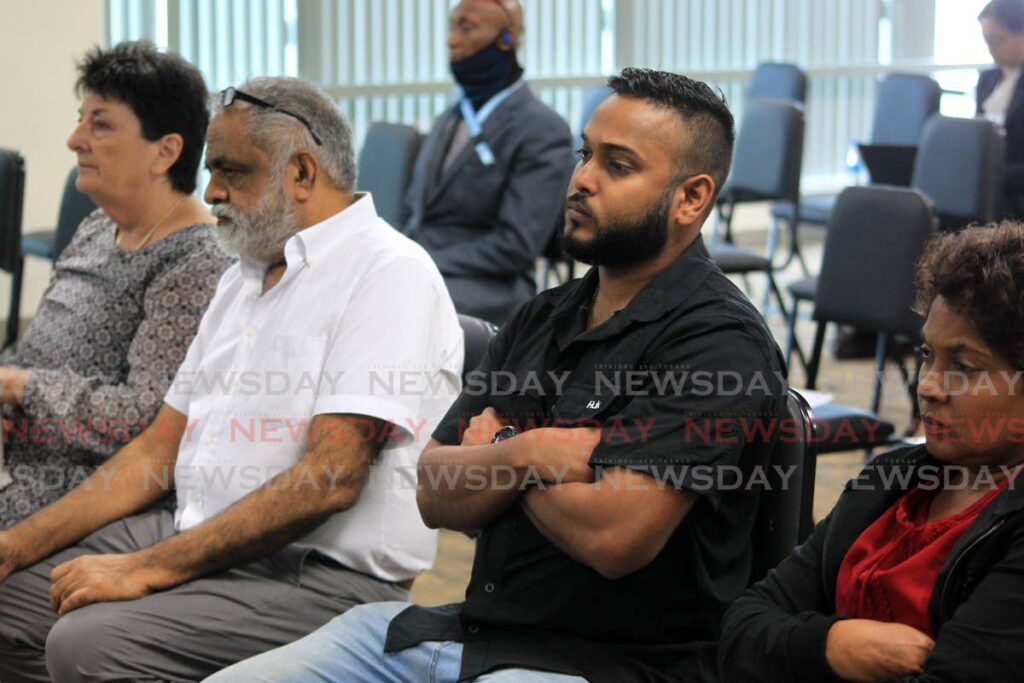Evidence from Paria, LMCS point fingers at each other during first CoE hearing

Attorneys representing the Paria Fuel Trading Company Ltd and the Land and Marine Construction Services Ltd (LMCS) laid out their respective arguments before a commission of enquiry (CoE), in which they each ascribed responsibility for the deaths of four divers to the other.
The divers – Kazim Jeremiah Ali, Yusuf Henry, Fyzal Kurban and Rishi Nagassar – died while working on a pipeline at the Paria Fuel Trading Company in Pointe-a-Pierre on February 25.
They worked with LMCS which was contracted by Paria to do maintenance work.
During the third session of the CoE on Monday afternoon, chairman Jerome Lynch, KC, heard arguments from attorneys representing the companies.
Addressing the commission, Gilbert Peterson, SC, who represents Paria and the Heritage Petroleum Company, gave a summary of the evidence and witness testimonies they will present.
Referring to the removal of a mechanical and an inflatable plug from the pipeline, which is believed to be what led to the trapping and eventual deaths of the divers, Peterson said Paria was "in the dark" over their removal, as no instructions were given to do so.
He said LMCS's failure to notify Paria hampered rescue efforts, as the former did not provide information as soon as the incident happened.
"Put differently, Paria was entirely in the dark as to the intended removal of the mechanical plug and the inflatable plug on that fateful day.
"The evidence will disclose that the tender process envisaged by LMCS, as the contractor undertaking the work, was directly responsible for any immediate emergency response, with appropriate follow-up support from Paria given thereafter.
"To this end, LMCS was required to have, among other things, divers and other diving support equipment in order to facilitate an emergency response – an effective emergency response.
Peterson also asserted that in selecting a contractor, Paria ensured the company met the necessary requirements and would be prepared to render emergency aid.
"Significantly, Paria's evidence will reveal that LMCS failed to notify Paria of the incident at the time it occurred and that Paria, upon learning of the incident, actively pursued LMCS for information, with a view to providing the support and any resources that it could have deployed.
"It dawned on me: if LMCS has, as they claim, been forthcoming with their information, and now everyone knew the men were in the pipe when the incident occurred, why would everyone be searching out in the sea?
"Because there is clear evidence – uncontroverted, uncontradicted – that there was a wide sea search. If it were all common knowledge that when the incident occurred the men were sucked into the pipe. then it would be a mystery to explain why there would have been that extensive search at sea."
Commenting on Paria's response, Peterson said the company was careful not to endanger more lives by ordering more divers to try to rescue those trapped.
In her address, the attorney representing LMCS, Kamini Persaud-Maraj, contended that Paria still had a responsibility to provide some supervision to the divers while they worked and, if necessary, stop the work from continuing if it became dangerous.
Referring to the company's Stop Work Policy, which authorised health, safety and environment (HSE) officers to stop work if they felt it could endanger workers' lives, Persaud-Maraj questioned why the work was allowed to continue if the plugs were removed by LMCS workers.
From the evidence before the CoE, she said, "We would demonstrate that Paria has in fact utilised its stop-work policy at various points in time, at least on one occasion, and had gone into an investigation of the incident alluded to by my learned friend,
"It is directly demonstrating that incident that Paria has that control mechanism and they have used it in this contract.
"It's not a simple plug that one can pull. These things take a process, there is an unbolting process and it takes some time, and the evidence will demonstrate that when someone is observing
that they had the moment to say this is work that ought not to be carried out but no such stop was made at the point in time. It was only upon the second plug being taken out that the incident occurred."
The commission is expected to continue on Tuesday, when the only surviving diver, Christopher Boodram, will give oral evidence.
Facilities engineer Hassan Mohammed and technical maintenance manager Michael Wei, both of Paria, are also expected to give evidence.


Comments
"Evidence from Paria, LMCS point fingers at each other during first CoE hearing"